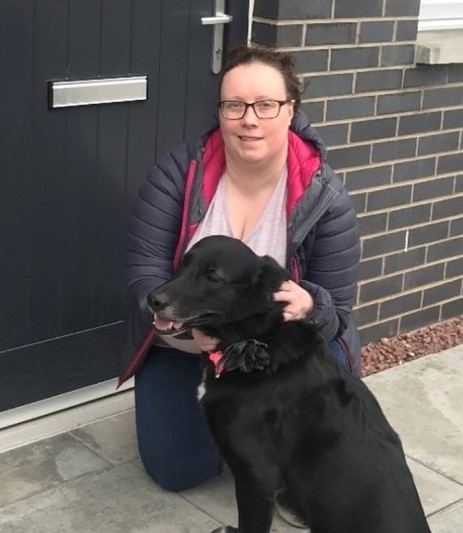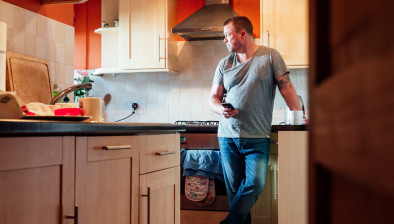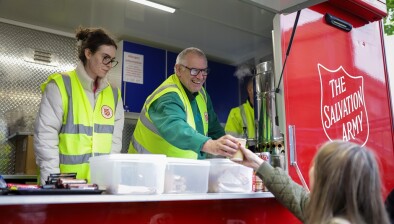Major report outlines homelessness experience of veterans
A detailed new report into veterans’ homelessness in Scotland is recommending that every local authority housing department should have an armed forces lead officer, social landlords should prioritise ex-Service personnel and more support should be provided for tenancy sustainment in the private rented sector.

Afghanistan veteran Sam (Image credit Veterans Housing Scotland)
Veterans’ Scotland Housing Group was asked by the Scottish Government to produce a report looking in detail at factors leading to or contributing to homelessness among people leaving the forces.
Containing 24 recommendations to improve the housing experience of veterans, the ‘Veterans’ Homelessness Prevention Pathway’ has been produced in partnership by Homeless Network Scotland, Housing Options Military Matters, Scottish Veterans Residences, Veterans Housing Scotland, Veterans Scotland and the report’s author is Dr Steve Rolfe, from the University of Stirling. It will feed into the government’s Ending Homelessness Together Action Plan, which includes Pathways similar to this one for other groups at particular risk.
Approximately 800 homelessness applications annually in Scotland are from households with a member who was previously in the Services. Concerns remain that the true figure could be higher. Veterans affected by homelessness are more likely than non-veterans to experience rough sleeping and other complex issues, with one estimate quoted in the Pathway report attributing service experiences as a cause of homelessness in around 25% of cases. Also highlighted in the report is that homelessness can occur many years after discharge from the Forces because of what is known as ‘delayed transition’ which can be due to a reluctance to seek help or the deferred impact of previous trauma.
The report highlights an additional housing challenge for military households in the degree of mobility they experience. Moving around can make it more difficult to buy a home until nearer the end of a military career, with single people often finding transition particularly difficult if they have lived in Armed Forces accommodation for many years.
Sam was a combat medical technician in Afghanistan before a knee injury and post traumatic stress disorder led to her being medically discharged. Sam could not find settled housing and was struggling to see a positive outcome until getting help from support organisations and the local council last year. Sam now has a home and a pet dog called Kiera – she is training to become a paramedic.
Sam said: “When I was preparing to leave the Army, I found it difficult to navigate the housing system, I had no knowledge of homelessness and in the job, everything is provided. I think people leaving the Forces find it hard to ask for help sometimes, either because of pride or just not knowing where to go. I am grateful to Housing Options Scotland, Veterans Housing Scotland and East Lothian Council. This place is so much more than a new home, it represents a new start and I want to say a big thank you to everyone who helped me along the way.”
Housing secretary, Shona Robison MSP, said: “I welcome this report and thank everyone involved for the time spent developing its recommendations. We’re working to end homelessness in Scotland once and for all. We are also continually aware of the great sacrifices that veterans have made – they cannot be allowed to suffer any disadvantage as a result of their service. This report highlights the challenges and where improvements can be made, and we will continue to review the findings as part of our work to ensure everyone in Scotland has a home that meets their needs.”
Kevin Gray, CEO of Veterans Housing Scotland and chair of the Veterans Scotland Housing Group, said: “Working with committed colleagues in the veterans community, charity sector and people with lived experience of homelessness willing to devote time and energy to produce a pathway that will prevent homelessness has been incredible, thank you to all those involved.
“Nobody should have to face homelessness and this report supports the overall aim of reducing and preventing homelessness for veterans in Scotland. It should be looked upon as a credible tool to support people who have served their country, moved on and require a settled home. Our aim must be to provide affordable and appropriate housing that allows military veterans and their families to lead active, dignified and positive lives when their service comes to an end, while remaining connected to support organisations throughout Scotland and networks of people with similar experiences.”
The 24 Recommendations are grouped around seven themes:
- appropriate timely information
- complexity of the housing system
- delayed transition effects – sustaining a tenancy
- coordination and awareness of veterans’ issues
- specific policy barriers
- equalities
- making sure the Pathway is implemented.
With one day of military service sufficient for someone to be classed as a veteran and diversity within the military increasing, the range of experiences and needs people have moving back into civilian life is recognised. Considering disability, equality, age, ethnicity and other characteristics a one-size-fits-all approach is no longer an option. The team preparing the report spoke to veterans, people with experience of homelessness and professionals providing support. The finished document adds to existing evidence as well as contributing a fresh perspective on what is needed to ensure everyone leaving the Services receives the type of support they need as quickly as possible.







